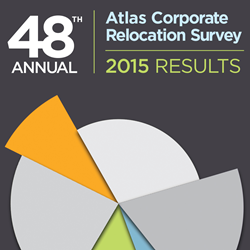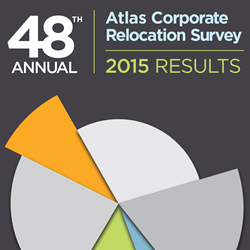Corporate Relocation Volume and Budgets on the Rise According to Atlas Van Lines’ Corporate Relocation Survey


Evansville, Ind. (PRWEB) April 23, 2015
According to one of the nation’s leading movers, Atlas Van Lines, the past year was one of increased corporate relocations. In response to the 48th Annual Corporate Relocation Survey, 49 percent of firms saw relocation volumes increase in 2014 and roughly half expect volumes to increase further overall and internationally in 2015.
As volumes increased in recent years after the Great Recession, budgets did not keep pace. However, in 2014, nearly half of companies indicate their relocation budgets finally increased and almost half believe their budgets will increase again in 2015. Even with budget increases occurring, the way relocation dollars are allocated has fundamentally changed. As volumes increase and reimbursement methods for current employees remain similar to recent years, full reimbursement of expenses for new hires has fallen out of favor in comparison to lump sum payments and partial reimbursement. Therefore, the industry can expect to see less full reimbursement coverage and more lump sums. In addition, roughly two-thirds of respondents indicate they are using alternative assignments of some type, far more than in the previous three years.
“We’re thrilled to see our longest running industry survey results identify increased relocation volume and budgets,” said Jack Griffin, president and COO of Atlas World Group. “Our human resource and mobility peers expect corporate relocations to increase throughout the remainder of 2015, and we look forward to working alongside them to identify key insights that will continue to assist them in their profession.”
Basic 2014 Results:
On average, companies relocated 50-99 employees in 2014.
The greatest growth in relocation occurred at international firms with more than half reporting increases in both overall volumes and budgets.
Company growth and lack of local talent tied for the top factors that impacted relocation volumes in 2014. However, these are nearly equal in weight to economic conditions (38 percent) as well.
The real estate market’s impact on relocation is now at its lowest level since measurement began in 2007 (22 percent) at 21 percent.
Fifty-nine percent of firms saw employees decline relocation.
Roughly twice as many firms are using lumps sums to cover real estate assistance/transactions (28 percent vs. 11 percent+) or rental assistance transactions (32 percent vs. 16 percent+) than in the previous four years on average. At the same time, use of lump sums to cover miscellaneous allowances has dropped significantly (40 percent vs. 53 percent+).
Overall, firms reported company growth and the lack of local talent as nearly equal drivers of relocation last year. However, 45 percent of respondents indicated that some form of expansion listed impacted their relocation volumes, making it the top factor overall, which is significantly higher than reported in ten out of the previous twelve years. Additionally, spouse and partner employment has progressively increased as a reason for relocation declinations over the past three years and is now at its highest level since the turn of the century. However, far more firms now offer spouse and partner employment assistance. Firms of all sizes are driving the increase; however, it continues to be offered more often by mid-size (69 percent) and large (72 percent) firms than by small firms (54 percent).
2015 Survey Fast Facts:
Nearly half (49 percent) of all relocations last year were new hires.
Nearly three-fourths of those surveyed say their most frequently relocated employees are 30-40 years old.
Eighty-six percent of companies are utilizing aspects of core/flex policy and 65 percent are using alternative assignments.
Around two-thirds of firms offer employment assistance to the spouse or partner, which is far more than in previous years.
Fifty-three percent of firms are now offering elder care assistance and even more (64 percent) are offering child care help for relocating employees.
The vast majority are now performing candidate assessments (77 percent) prior to relocation offers.
For new hires, full reimbursement has fallen to the lowest levels historically (38 percent); transferees are the most likely to receive full reimbursement (66 percent) of relocation expenses.
Firms are using lump sums and partial reimbursement at similar levels: roughly half utilize lump sums for either transferees (48 percent) or new hires (51 percent) and around two-fifths use partial reimbursement for either transferees (40 percent) or new hires (41 percent). Far more firms are simply not reimbursing expenses for new hires (20 percent) or transferees (16 percent) on occasion.
Seventy-four percent of companies pay transportation expenses directly for transferees and 60 percent do so for new hires.
Nearly 500 corporate relocation professionals completed the online survey between January 20 and February 26. The respondent demographic of the annual corporate relocation survey includes human resources/personnel and relocation/mobility services departments for service, manufacturing, wholesale/retail, financial and government organizations. More than half of the companies have an international presence and relocate employees between countries. Respondents have relocation responsibility and work for a company that has either relocated employees within the past two years or plans to relocate employees this year.
Atlas continues to anticipate and answer trends. Findings from the Annual Survey inform the development of new service options. For example, with the shift in full reimbursement of expenses for new hires to lump sum payments, the launch of this year’s survey results follows the release of movr™, the first web-based portal from a moving company to offer a one-stop resource for an employee’s relocation needs. Customers in motion can use movr™, for assistance in finding a new home, utility setup, mail forwarding, storage and more.
For complete survey results, visit the Atlas Corporate Relocation Survey results online. View the infographic: “Corporations Go Far to Assemble Super Teams” for a look at the importance corporations place on the getting the right employees in the right locations.
About Atlas Van Lines
Atlas Van Lines, a national moving company, is the largest subsidiary of Atlas World Group, an Evansville, Indiana-based company. Atlas World Group companies employ nearly 700 people throughout North America. Nearly 500 Atlas interstate moving agents in the United States and Canada specialize in corporate relocation, household moving services and in the specialized transportation of high-value items such as electronics, fine art, store fixtures and furniture. For more information, visit http://www.atlasvanlines.com.